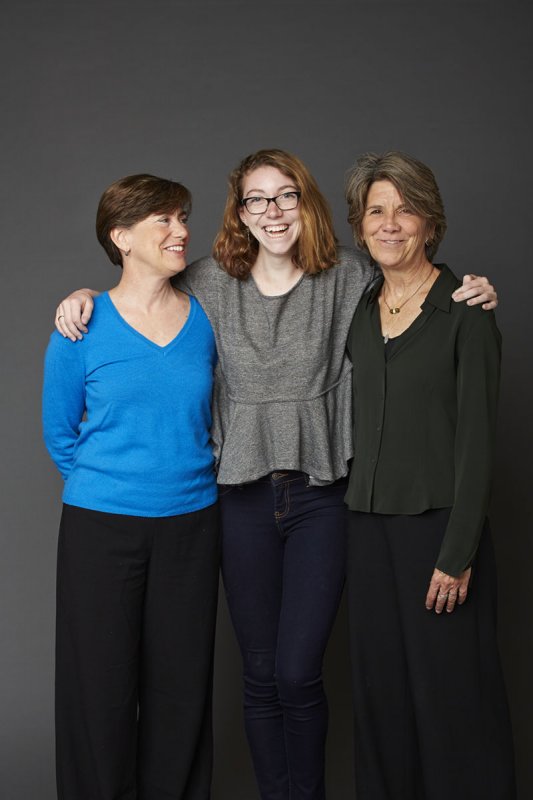
Hillary and Julie Goodridge
As the lead plaintiffs in Goodridge v. Dept. of Public Health, Hillary and Julie became the unified face and voice of thousands of gay couples across the country. And by now, most people know their story: how Hillary had to fight to be by the side of Julie and their newborn daughter, Annie, after a precarious birth. How they eventually filed suit for the right to marry, to protect the relationship and family they had built over 15 years. And how, alongside six other couples, their personal stories launched a political movement that not only established equal marriage in Massachusetts, but also spurred a culture change that paid dividends in additional victories across the country. Together, they made history.
Several years later they divorced, and weathered another round of public scrutiny. They haven’t discussed that as much. But in reflecting on the legacy of the their case, its ups and downs, it becomes clear that their marriage ended the same way it began: with love.
“I think it’s important to talk about the divorce,” says Julie, sitting in the Jamaica Plain office where she runs NorthStar Asset Management, a wealth management firm that helps clients identify socially and politically responsible investments. She and Hillary initially separated in 2006. And though Julie is known for a fairly unflappable public demeanor (sparring with right-wing pundits builds a pretty thick skin), she becomes emotional as she broaches the topic of their divorce, finalized in 2009.
“The process of being married felt extraordinary to me. It was profound. Going through the divorce was equally profound,” she explains. She takes a moment to collect herself. “Because in that process, if you allow yourself to be truly present, you can experience all the good reasons that you married that person. You can go through it in an incredibly respectful and healing way.”
“Hillary and I pulled that off,” she says. “I’m proud of that.”
And they should be. As the case’s most public faces, Hillary and Julie were tasked, fairly or not, with representing an entire community on a national stage. To be at the center of history was an “amazing privilege,” says Hillary. But it was also daunting. Whether they were speaking at the State House or appearing on TV news programs, everything, from their words to their wardrobe, was placed under a microscope and subject to critique—including by the LGBT community.
Naturally, the experience strained their relationship, admits Julie. “I think we both felt we needed to be as perfect as we could be,” she says. “Even given everything we had already been through together, the kind of scrutiny that we were under created a level of stress for our family I could not possibly have imagined.”
Getting married in front of the world wasn’t easy. But getting divorced in front of it was even harder. “The emotions are already confusing,” says Hillary. “And it’s coupled with this feeling that you’ve let everyone down.”
Some even felt emboldened to tell them as much. Julie bristles when she recalls one lengthy email she received, from a “close friend and public figure,” chastising her in the wake of the separation. “It was all about how I had a responsibility to tell the community first about any issues we were having,” she recounts. “It was unbelievable. This was a personal decision.”
And it was one that, as always, they undertook together. It also underscored for them the value of marriage and the supportive foundation it offers to families. “What I learned is that this institution also guides you through dismantling a relationship,” says Hillary. “That’s a really important, good thing when you’re at your most vulnerable.”
And it’s why now they remain such close friends. They still talk regularly. When the Supreme Court ruled in the Windsor case last June, striking down a key provision of DOMA, Hillary’s first call was to Julie. They co-parent their daughter Annie, now 18. Hillary, who continues to work as director of the Unitarian Universalist Funding Program, also raises a 12-year old stepdaughter with her partner. And they share a rare, special connection that will never go away. Julie laughs at a recent day spent taking Annie on college tours, when both moms coincidentally showed up in identical outfits. (“Annie was horrified,” she chuckles.) They still share an amazing bond, if not a marriage.
Most importantly, they share a legacy. “It’s jaw-dropping,” says Hillary, reflecting on the progress that equal marriage has made since their case. “And it’s also affirming. “Because at the time, when the idea of same-sex marriage was first being brought up in a really serious way, the reaction was often, ‘are you kidding?’”
“I feel proud of it,” says Julie of the impact of the Goodridge case. “We still have a long way to go. But I think marriage acted as a catalyst for a lot of acceptance among all consonants of the L, G, B and T.” There’s work to do with regard to every letter, she adds. But thanks to “Goodridge,” tides have turned.
“When you see a big outpouring of love, you can’t help but be swept away.”








